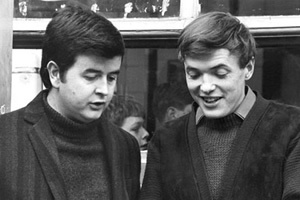Restoring The Likely Lads
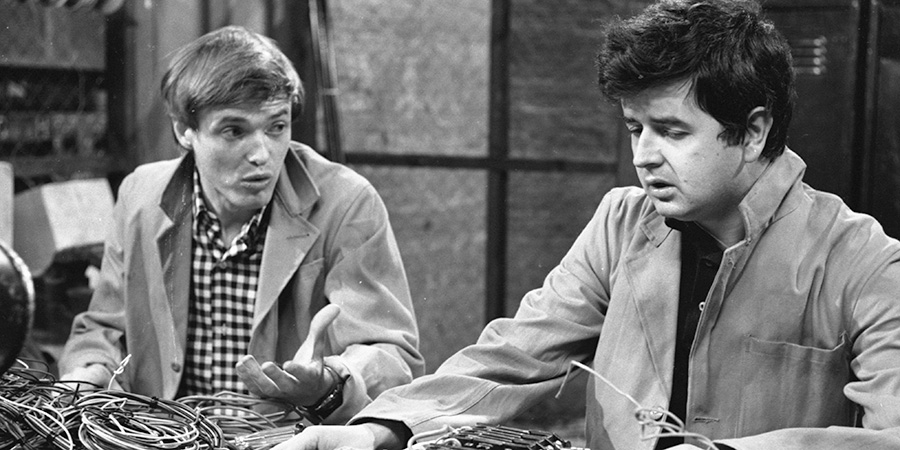
Producer Charles Norton discusses the landmark 60th anniversary DVD collection of important BBC sitcom The Likely Lads and its successor, Whatever Happened To The Likely Lads?.
I was contacted back in May 2024 to ask if I had any ideas for a Likely Lads DVD set that BBC Studios were thinking about releasing to mark the series' 60th anniversary. I put a suggested breakdown of features together and work began properly at the start of August.
The first job was working out exactly what the archive holdings were. All of the original transmission masters still survive for the 1970s series, Whatever Happened To The Likely Lads?, and these were remastered to a very high standard by Jonathan Wood a few years back. However, the original 1960s series is a lot more complicated. We don't have any of the original transmission masters for any of the episodes made between 1964 and '66, with the exception of the 1964 Christmas special, which was broadcast from 35mm film and probably still survives for that reason.
All of the other episodes we still have from that original 60s run now exist purely as 16mm film telerecorded copies of now-lost video masters. And, of course, for a number of episodes, we don't even have a 16mm copy. Andrew Martin at BBC Information & Archives (I&A) was massively helpful here, in helping to create a full breakdown of what episodes existed in which format and what other supplementary material was held beyond those episodes. It is entirely thanks to Andrew that we were able to present so much footage from the otherwise lost Where Have All The Flowers Gone? episode from Series 2. And we're all really grateful to all the help the team at BBC I&A gave us on the project.
The BBC archives had audio recordings for five of the ten lost TV episodes. I believe they were donated to the archive as part of the BBC's Treasure Hunt project in around 2002. The sound quality is a bit variable, but they are the original TV episodes. They would have been recorded quite simply by someone watching the episodes at home during their original TV transmissions and holding a microphone up to their TV set.
For the other five lost episodes, we used the adaptations that were made for BBC radio back in 1967 and 1968, featuring most of the original cast. The main problem here was that the BBC archives hadn't kept all of those radio episodes either. In fact, they'd only retained one (a copy of Baby, It's Cold Outside from 1967). The sound quality of this one episode was excellent, as it was a copy of the broadcast master. However, it was only one episode and it still left us with four episodes for which we had no copy at all.
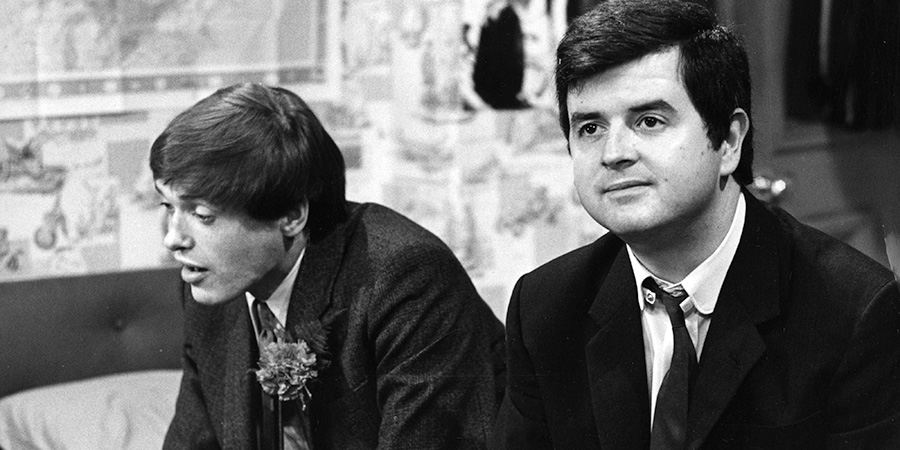
It was here that Roger Bickerton from the Radio Circle group was able to help. He had off-air recordings of all of sixteen radio episodes and was able to help us fill the gaps. Again, these were off-air recordings made by listeners at the time of broadcast, holding up microphones to their radio sets. Once again, the sound is a bit variable (and some are missing parts of the opening theme music), but the overall quality is generally quite acceptable and in most cases is actually a bit better than the off-air TV episodes.
That gave us five of the lost episodes as TV audios and five as radio audios. And that was very much how we were planning to release things. However, then, in early September we were alerted to another off-air TV audio turning up (Talk Of The Town) in a private collection.
It had been recorded back in the 60s by a man called Mike Dodsworth, who had donated his tape to the Tony Hancock Appreciation Society, who in turn were able to provide us with a copy. It came to us just in time for it to be included on the final release.
The final breakdown of audio episodes is as follows.
TV audio:
Chance Of A Lifetime
The Talk Of The Town
Friends And Neighbours
Brief Encounter
The Razor's Edge
Anchors Aweigh
Radio audio:
Baby, It's Cold Outside
Where Have All The Flowers Gone?
Outward Bound
Love And Marriage
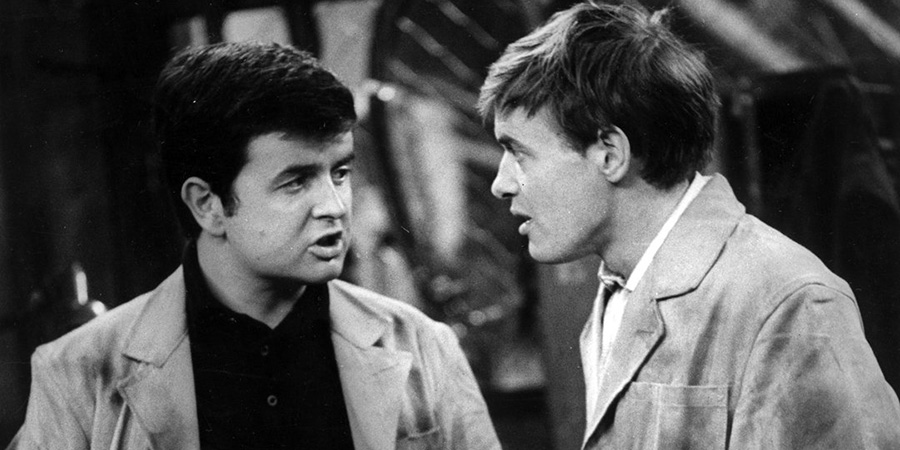
Some of the existing video transfers in the BBC's digital archive were extremely old and rough round the edges so they were remastered with more modern equipment. Additionally, some transfers had been made from old prints that we now have a better source for. In one case, the digital master for an episode was actually corrupted and couldn't be played through, so that print needed a new transfer making regardless.
The BBC's existing transfers for the first two episodes - Entente Cordiale and Double Date - were especially bad. Really dreadful picture quality. The films had been transferred to tape back in the 70s and 80s and those decades-old tape transfers were what were still being used for the BBC's default masters on the digital archive all these years on. There'd just never been an occasion to update them. Other episodes had been transferred back in the mid-1990s for a BBC 2 repeat run. These transfers were much better quality, but nowhere near the level that could be achieved with modern film scanners, so we redid some of those too. We didn't re-scan everything, of course. There were some relatively new scans on file that we were able to re-use as they were, but a lot were redone.
The kind of picture quality we can get from a modern 2K film scanner is just so much better than what the kit was capable of back in the 70s, 80s and 90s. It's not that the original transfers were done badly; it's just that there was only so much you could get out of one of those old twin-lens telecine machines. They tended to blow out whites and crush blacks and you frequently got things quite dramatically zoomed in.
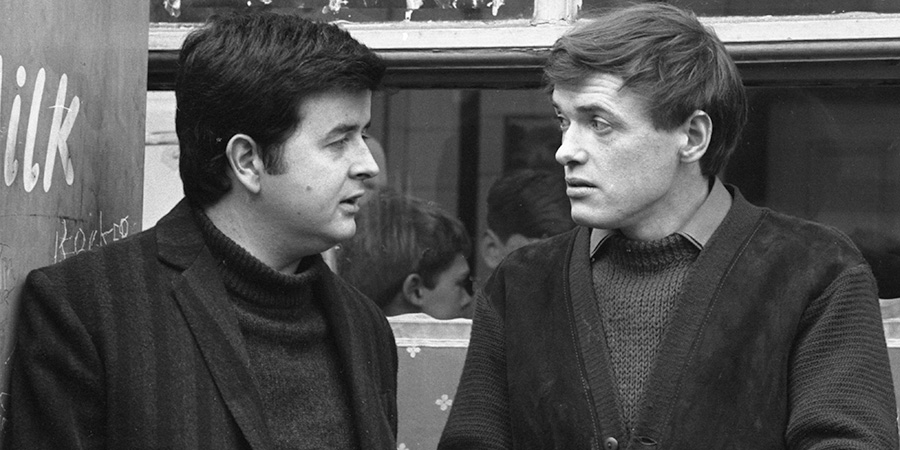
The most obvious improvement we achieved was had with those first two episodes - particularly Entente Cordiale, where we were able to scan a new print provided to us from the archive team at De Montfort University in Leicester. This new print was significantly better than the existing copy the BBC had and so gave us a much better base to work from.
Double Date is an exceptionally well-written episode. All the better now you can see it without the picture bouncing up and down across the screen. The episode is beautifully structured and far more naturalistic in tone than many sitcoms of the 60s and 70s would be. Susan Jameson and Coral Atkins are especially good in it.
On a technical level the episode took a little bit of work as we had some burnt-in sprocket damage, but it scrubbed up fine in the end.
There were smaller things that got scanned too. There was a specially-shot 1960s piece from James Bolam that nobody had ever transferred from film before. So, that was scanned. Andrew Martin managed to find a section of a Series 2 episode on the end of a film roll for an episode of Panorama, that we also had scanned.
As well as the episodes themselves, we managed to include quite a few archive pieces among the special features on the release and most of that was down to Andrew's digging around for us. The 1976 Lively Arts documentary was a particular highlight here.
We also recorded three new audio commentaries for the set. We had Dick Clement and Ian La Frenais on both the first and last episode of the original run and they were joined on a third episode by George Layton, who was a recurring guest actor in the series. Toby Hadoke presented those for us and they were recorded on Wednesday 4th September.
Help us publish more great content by becoming a BCG Supporter. You'll be backing our mission to champion, celebrate and promote British comedy in all its forms: past, present and future.
We understand times are tough, but if you believe in the power of laughter we'd be honoured to have you join us. Advertising doesn't cover our costs, so every single donation matters and is put to good use. Thank you.
Love comedy? Find out moreThe Likely Lads Complete Collection: 60th Anniversary Edition

All episodes of The Likely Lads and its sequel Whatever Happened To The Likely Lads?, released together on DVD for the first time.
The first series to be made by prolific writing partners Dick Clement and Ian La Frenais, The Likely Lads chronicled the misadventures of best friends Bob (Rodney Bewes) and Terry (James Bolam), as they navigated life and love in a northern town in the 1960s. The series ran for three series (and one Christmas special) from 1964 to 1966. One of a wave of innovative new working class sitcoms in the 1960s, the series was the first top 20 comedy hit for BBC Two.
In the early 1970s, the series was revived as the even more successful Whatever Happened To The Likely Lads?, picking up on Bob and Terry seven years later and looking at how their lives had drifted apart in the intervening years. The show rose to become the second most watched television programme in Britain, running to 26 episodes, plus another Christmas special.
All 38 surviving episodes of the two series are presented here together on DVD for the first time, alongside audio recordings of 10 otherwise lost episodes from the 1960s that were never archived by the BBC. Additional features, exclusive to this set, include two documentaries about the programme; footage from one of the lost episodes; two new audio commentaries from Dick Clement and Ian La Frenais; and a collection of previously unreleased archive content.
First released: Monday 25th November 2024
- Distributor: BBC
- Region: 2
- Discs: 7
- Minutes: 1,420
- Subtitles: English
- Catalogue: BBCDVD4618
![]() Buy and sell old and new items
Buy and sell old and new items
Search for this product on eBay
BCG may earn commission on sales generated through the links above.

